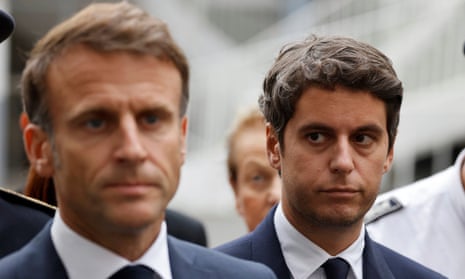To an American (now French by naturalisation) who spent four traumatised years being metaphorically punched in the face over and over by the unceasing nature of Donald Trump’s “latest outrage”, Emmanuel Macron will never merit the hysterical reactions he provokes in France. Rather, he is a president of missed opportunities, and with a problem similar to Joe Biden’s: his record is far from bad, but the “vibe” that carried him to the Élysée in 2017 has long since shifted from enthusiasm to generalised discontent.
Public dissatisfaction with Macron has been fuelled by his outgoing prime minister Élisabeth Borne’s repeated recourse to a deeply unpopular constitutional measure, article 49.3, to get laws passed – including hated pension reforms – in the absence of a clear legislative majority. The clause inverts normal legislative proceedings and is supposed to be a last resort, not a routine feature of government.
By sacking the 62-year-old Borne this week and naming 34-year-old Gabriel Attal as his new prime minister – the youngest in the history of the Fifth Republic – Macron seems to be trying to get the old vibes back. But is it too little, too late?
I’ll admit it: in spring 2017, I felt excitement at Macron’s Europe-centric, left-liberal message. Especially in the aftermath of the twin transatlantic disasters of Brexit and Trump.
The emotion was less personally poignant, because I wasn’t yet a French citizen with a vote of my own. But something about his election night victory gathering at the Louvre reminded me of the unbridled optimism of that night in November 2008, when the networks called Ohio for Obama, and I streamed out of my first-year college dorm to scream and hug with hundreds of my fellow classmates, all of us ecstatic about what our first ever votes had done.
It didn’t last, though Obama retained his “cool factor” far longer than Macron managed to, as he and the French left quickly deserted each other. It’s facile to critique with hindsight, but Macron made an enormous error in pursuing labour market liberalisation on its own, rather than presenting it alongside generational investment in renewables, education and health. A part of his hesitant left coalition judged this an original sin for which they would never forgive him; others were driven away by off-the-cuff arrogance and an unceasing need to be always at the centre of everything.
There has been a certain self-reinforcing nature to this. As the left under Jean-Luc Mélenchon chose increasingly recalcitrant opposition, Macron’s government drifted to the right; in contrast, the Bernie Sanders wing of the Democratic party in the US broadly remained in Biden’s camp, influencing everything from industrial to climate policy from the inside.
Even if some on the left see the ambitious young Attal, the former education minister, as slippery in the same way as Macron, and are unsure what he truly stands for, choosing him as prime minister is at the very least an acknowledgment from Macron that running after the far right is a losing game politically – for the nation and for his own coalition. The thing is though, Macron did have a chance to inject new life into his presidency and reach out to his flagging centre-left support – by nominating a young, left-liberal successor with strong environmental credentials 18 months ago.
Now this demographic seems better represented by 44-year-old Raphaël Glucksmann, a centre-left, pro-European, anti-Mélenchon politician whose platform is squarely aimed at the type of voters who waved European flags in front of the Louvre pyramid to celebrate Macron’s victory in 2017.
At the other end of the spectrum, the impending danger is not that Marine Le Pen herself will surf the wave of national discontent, it’s that her protege, 28-year-old Jordan Bardella, will do it, using a young face and the added bonus of not being named “Le Pen” to parry away the remaining taboos around the far-right National Rally.
In this context, not only is Attal, gay and a former Socialist party member, remarkably popular in recent polling; he is also a choice to fight youth with youth in the upcoming European parliamentary elections.
after newsletter promotion
There’s also an implication beyond the June elections, should Attal survive the same lack of a legislative majority that plagued Borne. Macron’s party has never really become a political force beyond Macron himself, in part because Macron’s political omnipresence prevents it. Some French commenters have seen in Macron’s choice of Attal just another sign of his ego – that the French president sees Attal as a “mini-me”.
Perhaps that’s true. But if Macron wants Attal to carry his baton, he’ll have to do something that doesn’t seem to come naturally: take a step back and out of the way.
Alexander Hurst is a Guardian Europe columnist
Do you have an opinion on the issues raised in this article? If you would like to submit a response of up to 300 words by email to be considered for publication in our letters section, please click here.

